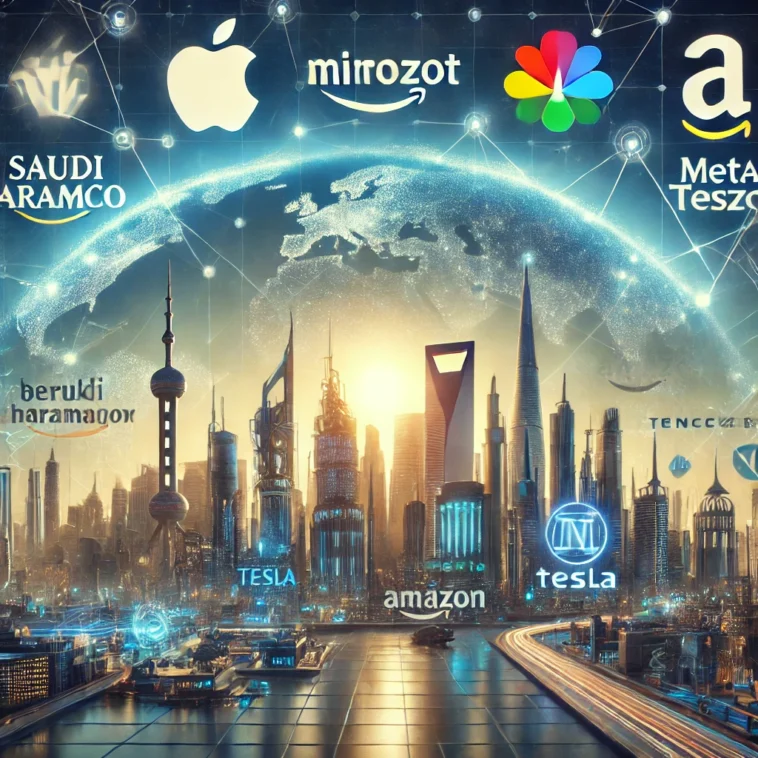The global economy is shaped by a handful of powerful corporations that lead their respective industries through innovation, strategic acquisitions, and market dominance. In 2024, these ten companies are at the forefront, influencing global trends, driving economic growth, and setting the stage for the future of business.
1. Apple Inc.
- Industry: Technology
- Headquarters: Cupertino, California, USA
- Market Cap: $3.5 trillion
- Revenue (2023): $400 billion
- CEO: Tim Cook
- Employees: 154,000
- Key Products/Services: iPhone, Mac, Apple Watch, iOS, App Store, Apple Music
- Expert Insight: “Apple’s relentless focus on design, user experience, and ecosystem integration has made it a leader in consumer technology. Their strategy of high-margin products coupled with a strong services ecosystem has driven sustainable growth.” — Sarah Martinez, Tech Analyst
- Analysis: Apple continues to push the boundaries of technology with its innovative products. The company’s investment in augmented reality (AR) and potential ventures into automotive technology could pave the way for future growth. However, challenges in supply chain management and increasing competition from other tech giants remain critical factors to watch.
2. Microsoft Corporation
- Industry: Technology
- Headquarters: Redmond, Washington, USA
- Market Cap: $2.9 trillion
- Revenue (2023): $210 billion
- CEO: Satya Nadella
- Employees: 221,000
- Key Products/Services: Windows, Office 365, Azure, LinkedIn, Xbox
- Expert Insight: “Microsoft’s transformation under Satya Nadella has been remarkable. Its pivot to cloud computing and subscription-based services has revitalized its business model, making it a formidable player in the tech industry.” — James O’Reilly, Cloud Computing Specialist
- Analysis: Microsoft’s Azure platform has become a cornerstone of the company’s success, driving significant revenue and profit margins. The ongoing growth in cloud services, coupled with advancements in AI and quantum computing, positions Microsoft as a leader in the next wave of technological innovation.
3. Saudi Aramco
- Industry: Oil & Gas
- Headquarters: Dhahran, Saudi Arabia
- Market Cap: $2.4 trillion
- Revenue (2023): $355 billion
- CEO: Amin H. Nasser
- Employees: 76,000
- Key Products/Services: Crude oil, natural gas, petroleum products
- Expert Insight: “Saudi Aramco’s unparalleled access to some of the world’s largest oil reserves ensures its dominance in the energy sector, even as the world shifts towards renewable energy sources.” — Daniel Smith, Energy Market Analyst
- Analysis: Despite global efforts to reduce dependency on fossil fuels, Saudi Aramco remains a pivotal player in the global energy market. Its extensive infrastructure, coupled with strategic investments in cleaner energy technologies, helps it maintain its influence and adapt to the changing energy landscape.
4. Amazon.com, Inc.
- Industry: E-commerce, Technology
- Headquarters: Seattle, Washington, USA
- Market Cap: $1.6 trillion
- Revenue (2023): $550 billion
- CEO: Andy Jassy
- Employees: 1.3 million
- Key Products/Services: Amazon.com, AWS, Kindle, Echo, Prime Video
- Expert Insight: “Amazon’s dominance in e-commerce is undisputed, but its real strength lies in Amazon Web Services (AWS), which drives a significant portion of its profitability.” — Laura Davies, E-commerce Strategist
- Analysis: Amazon’s ability to innovate across multiple sectors, from cloud computing to logistics, has solidified its place as a global leader. However, challenges such as regulatory scrutiny, labor issues, and competition in the cloud space pose potential risks to its growth trajectory.
5. Alphabet Inc. (Google)
- Industry: Technology
- Headquarters: Mountain View, California, USA
- Market Cap: $1.5 trillion
- Revenue (2023): $300 billion
- CEO: Sundar Pichai
- Employees: 190,000
- Key Products/Services: Google Search, YouTube, Android, Google Cloud, Google Ads
- Expert Insight: “Alphabet’s diverse portfolio, particularly in AI and cloud computing, positions it as a leader in both digital advertising and the broader tech industry.” — Maria Gonzalez, Digital Marketing Expert
- Analysis: Alphabet’s investments in AI, particularly through its DeepMind subsidiary, are expected to drive future growth. The company’s dominance in digital advertising remains strong, but increased competition from emerging platforms could challenge its market share.
6. Tesla, Inc.
- Industry: Automotive, Technology
- Headquarters: Austin, Texas, USA
- Market Cap: $1.2 trillion
- Revenue (2023): $80 billion
- CEO: Elon Musk
- Employees: 127,000
- Key Products/Services: Electric vehicles (EVs), SolarCity, Powerwall, Autonomous driving technology
- Expert Insight: “Tesla has revolutionized the automotive industry with its electric vehicles and energy solutions. Its focus on innovation and sustainability makes it a key player in the future of transportation.” — Anthony Moore, Automotive Analyst
- Analysis: Tesla’s leadership in the electric vehicle market is unmatched, but the company faces increasing competition from both legacy automakers and new entrants. Its focus on energy storage and autonomous driving technology will be critical in maintaining its competitive edge.
7. Berkshire Hathaway Inc.
- Industry: Conglomerate
- Headquarters: Omaha, Nebraska, USA
- Market Cap: $750 billion
- Revenue (2023): $276 billion
- CEO: Warren Buffett
- Employees: 360,000
- Key Products/Services: Insurance, Utilities, Manufacturing, Retail, Real estate
- Expert Insight: “Berkshire Hathaway’s diversified portfolio and value-driven investment strategy have consistently delivered strong returns, making it a model for long-term investors.” — Elizabeth Turner, Financial Analyst
- Analysis: Berkshire Hathaway’s success is rooted in its conservative investment approach and diversified holdings. The company’s significant cash reserves provide flexibility for future acquisitions, ensuring its continued relevance in the global market.
8. Meta Platforms, Inc. (Facebook)
- Industry: Technology, Social Media
- Headquarters: Menlo Park, California, USA
- Market Cap: $650 billion
- Revenue (2023): $118 billion
- CEO: Mark Zuckerberg
- Employees: 86,000
- Key Products/Services: Facebook, Instagram, WhatsApp, Oculus, Meta Quest
- Expert Insight: “Meta’s pivot towards the metaverse is a bold move that could reshape the future of social interaction, but it faces significant challenges in terms of user adoption and regulatory hurdles.” — Kevin Roberts, Social Media Strategist
- Analysis: Meta’s focus on the metaverse represents a significant shift in its business strategy. While its social media platforms continue to generate substantial revenue, the company’s future success will depend on its ability to lead in the emerging field of virtual reality.
9. Tencent Holdings Ltd.
- Industry: Technology, Entertainment
- Headquarters: Shenzhen, China
- Market Cap: $600 billion
- Revenue (2023): $90 billion
- CEO: Ma Huateng
- Employees: 104,000
- Key Products/Services: WeChat, QQ, Tencent Games, Tencent Music, Fintech
- Expert Insight: “Tencent’s dominance in social media and gaming in China is unparalleled, but its expansion into financial services and cloud computing could drive future growth.” — Wei Liu, China Tech Market Analyst
- Analysis: Tencent’s ecosystem is deeply embedded in the daily lives of Chinese consumers, from social media to payments. However, increasing regulatory scrutiny in China and competition from domestic and international rivals could impact its future growth.
10. Johnson & Johnson
- Industry: Pharmaceuticals, Healthcare
- Headquarters: New Brunswick, New Jersey, USA
- Market Cap: $550 billion
- Revenue (2023): $110 billion
- CEO: Joaquin Duato
- Employees: 144,000
- Key Products/Services: Pharmaceuticals, Medical Devices, Consumer Health Products
- Expert Insight: “Johnson & Johnson’s leadership in healthcare is underscored by its strong pipeline of pharmaceuticals and medical devices. Its role in public health, particularly during the COVID-19 pandemic, highlights its global impact.” — Dr. Emily Harris, Healthcare Industry Expert
- Analysis: Johnson & Johnson’s diversified portfolio in healthcare ensures its stability and growth potential. The company’s commitment to innovation, particularly in oncology and immunology, will be key drivers of its future success.
Conclusion
The companies on this list are not only leaders in their respective industries but also pioneers that shape the global economic landscape. Their strategies, innovations, and market positions will continue to influence business trends and consumer behavior in 2024 and beyond. As they navigate challenges such as regulatory pressures, technological disruption, and global competition, these companies will play a crucial role in defining the future of the global economy.
Explore more: Top 10 Mobile Brands in India: A 2024 Comprehensive Guide



